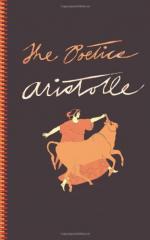
|
| Name: _________________________ | Period: ___________________ |
This test consists of 5 multiple choice questions, 5 short answer questions, and 10 short essay questions.
Multiple Choice Questions
1. Aristotle says that simply doing what well leaves a mediocre piece of art?
(a) Developing a main character that does not have a close friend.
(b) Giving the reader a sense of suspense.
(c) Writing a complication and unraveling.
(d) Infusing irony just at the beginning.
2. According to Aristotle, what type of poets attempt to create tragedies that result in everyone ultimately being happy?
(a) Innovative poets.
(b) Poets more concerned with pleasing their audience.
(c) Poets more interested in winning an award.
(d) Optimistic poets.
3. Aristotle explains that the complication accomplishes what?
(a) It ties the beginning to the end.
(b) It evokes pity.
(c) It draws the reader in with the suspense of how the problem will be resolved, if it ever is.
(d) It gives the reader a sense of resolution.
4. What would Aristotle say about the following action: a man is about to kill his brother, thinking him to be his enemy, but discovers his identity and therefore spares his life?
(a) An interesting turn of events.
(b) Poor plot development.
(c) Poor execution.
(d) The most successful kind of action.
5. Based on Aristotle's teachings about tragedy, how can the poet unify the plot?
(a) Use more verbs.
(b) Develop characters who behave in a believable manner.
(c) Establishing clear relationships between actions the rest of the plot.
(d) Use complete sentences.
Short Answer Questions
1. Why does Aristotle believe that a failed action by a person who is aware of the circumstances is considered to be of a certain quality?
2. Aristotle explains that a sign is one of four types of recognition. What is an example of recognition occurring through the use of a sign?
3. Why does Aristotle say that Homer's "Iliad" is not a tragedy?
4. Into how many parts does Aristotle say a language can be divided?
5. Aristotle asserts that the main character of a tragedy must have what?
Short Essay Questions
1. Based on "Poetics" by Aristotle, explain how the effect of a sad plot will be magnified?
2. Give an example that Aristotle provides in "Poetics" of the most successful kind of action in a tragedy.
3. What type of recognition is considered by Aristotle to be superior to the others and why?
4. Does Aristotle believe that Homer's "Iliad" should be written in the format of a tragedy? Why or why not?
5. In addition to recognition through sign, what are some other ways that Aristotle identifies as ways in which recognition can occur?
6. In regard to the plot device of recognition, give an example that Aristotle provides in "Poetics" of how recognition can occur through some recognition of sign.
7. Give an example that Aristotle provides in "Poetics" of a failed action where the character of a tragic story was aware of the circumstances then failed to follow through.
8. What types of situations does Aristotle say occur frequently in tragedy and why?
9. What does Aristotle say that a poet should do first when constructing the plot of a tragedy?
10. What does Aristotle identify as the goal of tragedy?
|
This section contains 956 words (approx. 4 pages at 300 words per page) |

|




